一般过去式与一般现在时区别
图片预览
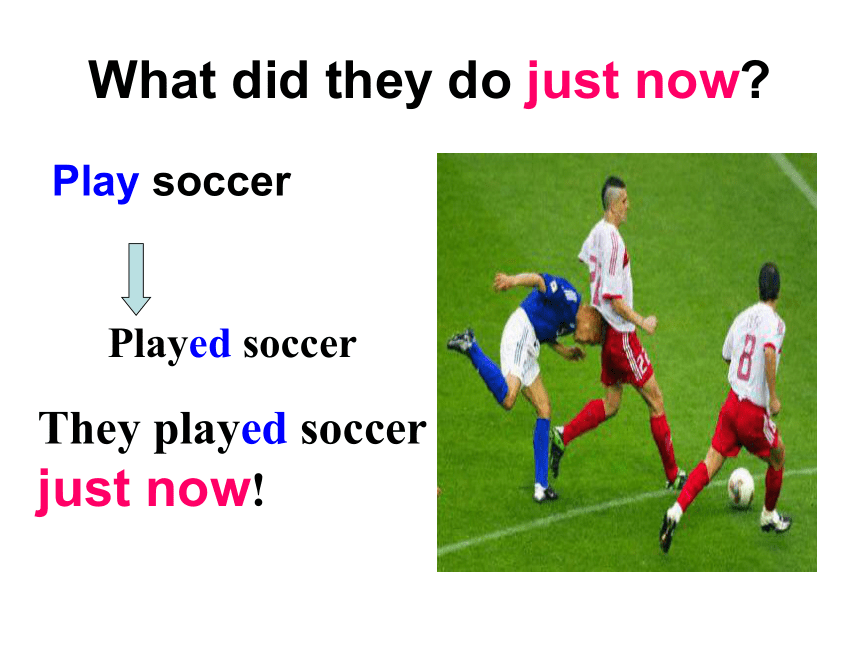
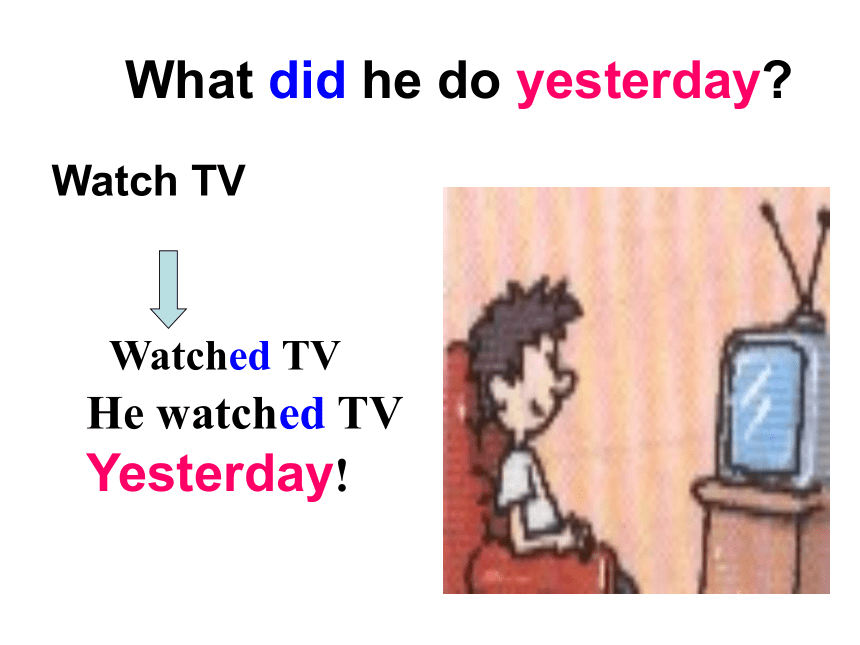
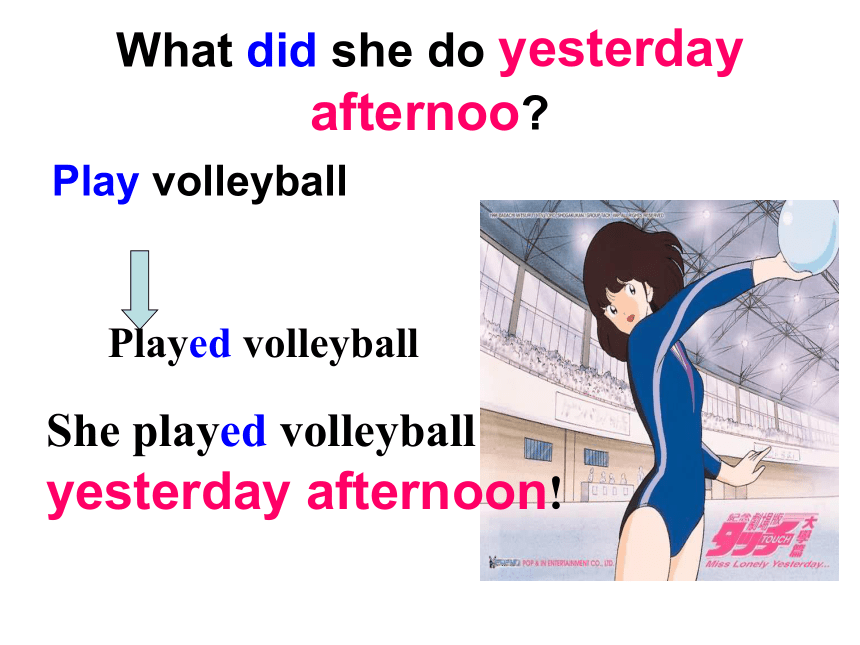
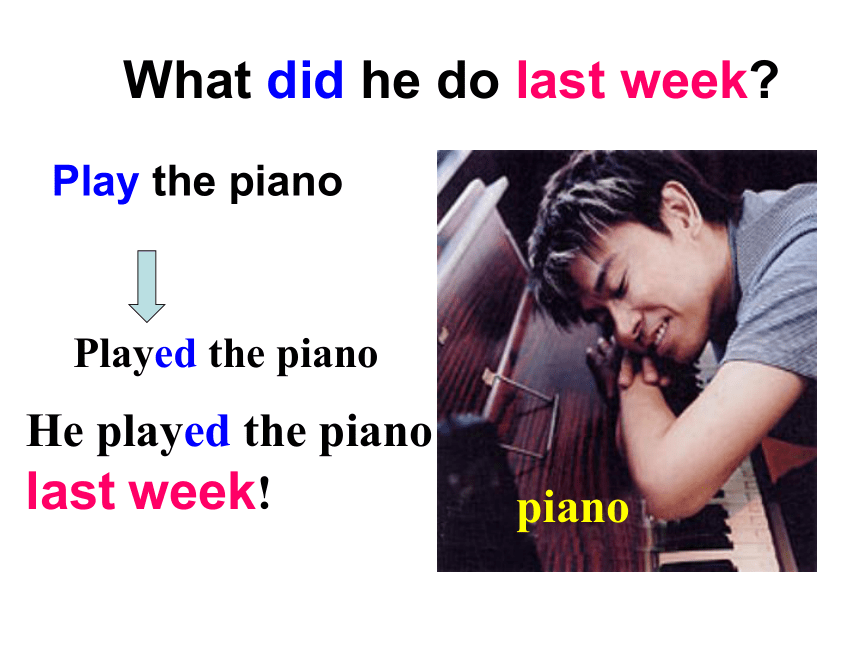
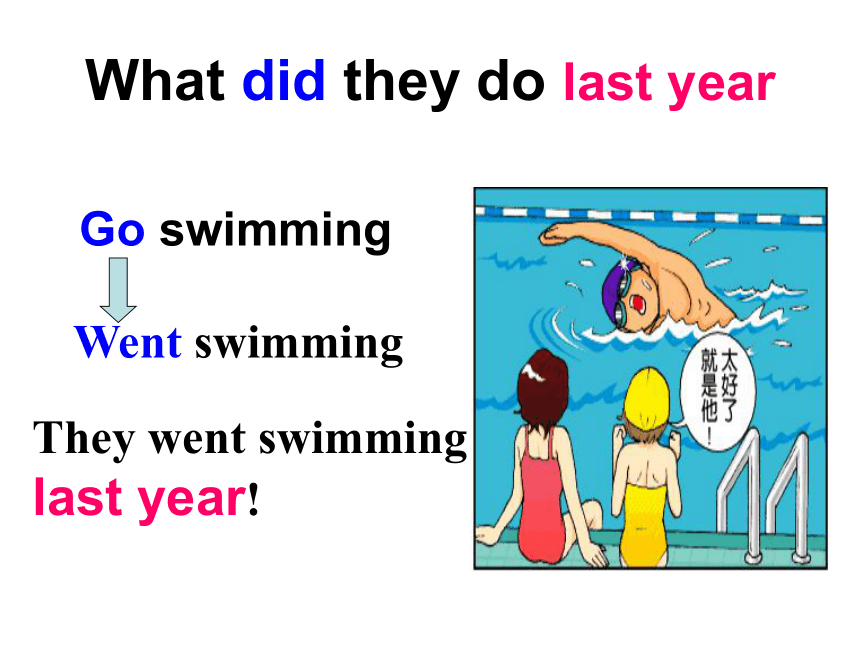
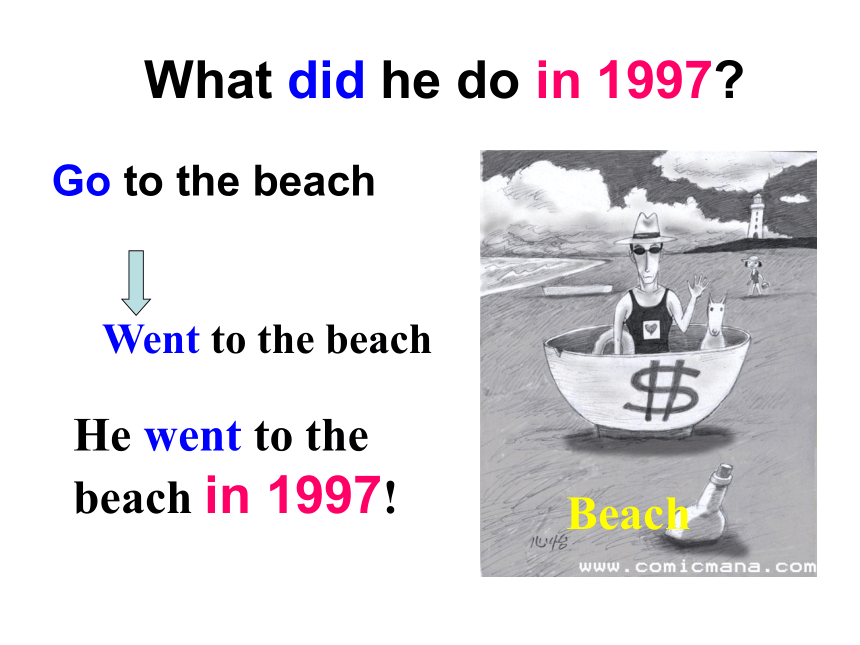

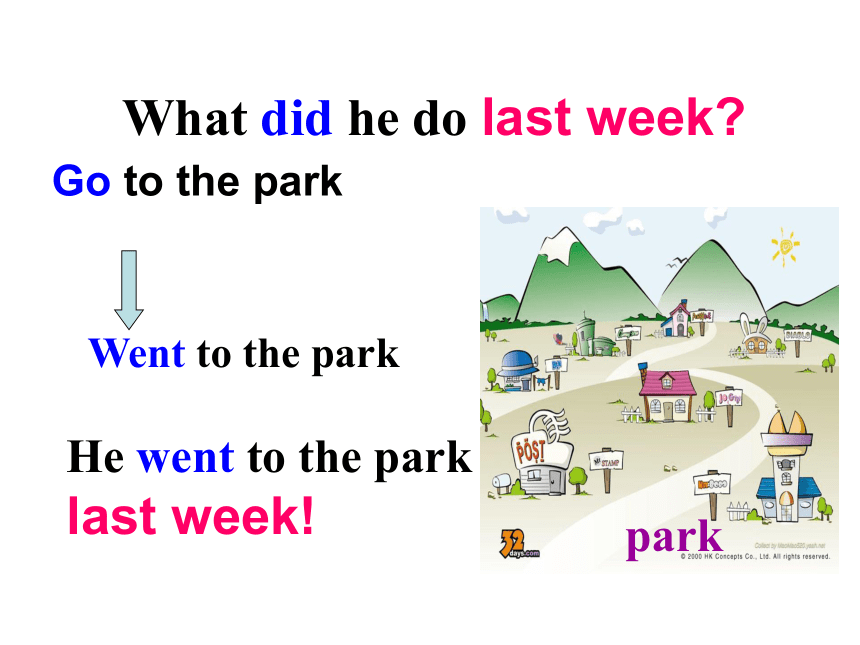

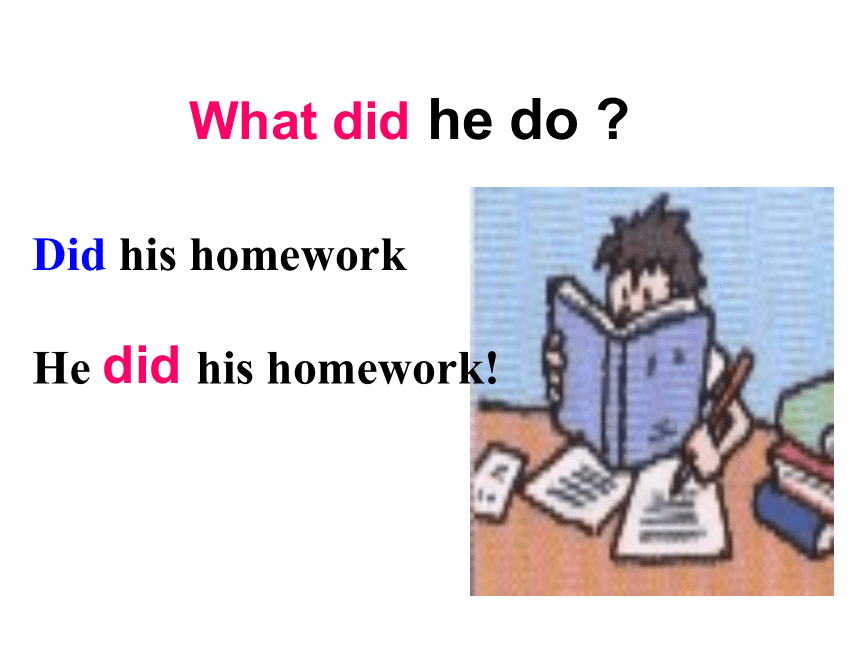

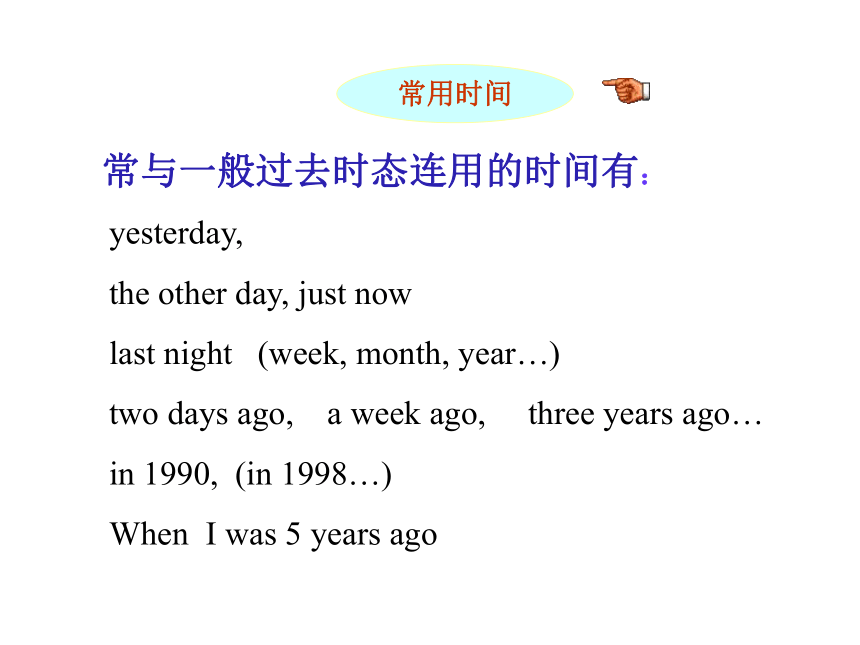
文档简介
课件47张PPT。What did they do just now?Play soccer
They played soccer
just now!Played soccer What did he do yesterday?Watch TV
Watched TVHe watched TV
Yesterday!What did she do yesterday afternoo?Play volleyball
Played volleyballShe played volleyball
yesterday afternoon! What did he do last week?Play the pianopianoPlayed the pianoHe played the piano
last week!What did they do last year Go swimming Went swimmingThey went swimming
last year! What did he do in 1997?Go to the beachBeachWent to the beachHe went to the beach in 1997! What did she do yesterday morning?Go to the moviesWent to the moviesShe went to the movie
yesterday morning! Go to the parkparkWhat did he do last week?Went to the parkHe went to the park
last week!Cleaned her roomWhat did she do yesterday?She cleaned her room yesterday!Did his homeworkWhat did he do ?He did his homework!Visited my friendsWhat did he do yesterday?He visited his friend yesterday!常用时间常与一般过去时态连用的时间有:yesterday,
the other day, just now
last night (week, month, year…)
two days ago, a week ago, three years ago…
in 1990, (in 1998…)
When I was 5 years ago返回上页返回首页返回练习动词过去式转换练习
答 案1. look looked 2. live lived 3. stop stopped
4. carry carried 5. hope hoped 6. trip tripped
7. call called 8. finish finished 9. want wanted
10.are were 11.go went 12.have had
13.do did 14.get got 15.come came
16.say said 17.see saw 18.put put
19.eat ate 20.take took 21.read read
①一般在动词原形末尾直接加上-ed。如:look-looked。
②以不发音的字母e结尾的动词加d。如:live-lived。
③末尾只有一个辅音字母的重读闭音节,先双写这个辅音字母,再加-ed。 如: stop-stopped
④末尾是辅音字母+y结尾的动词,先y变i为 ,然后再加 ed 。study- studied动词的规则变化主语 + be动词的过去式(was, were)~ .主语 + be动词的过去式(was, were)+ not ~ .be 动词的过去式(was, were)+主语 ~ ?He was busy yesterday.He was not busy yesterday.Was he busy yesterday?be 动词的过去时:主语 + 动词的过去式 ~ .主语 + did not + 动词原形 ~ .Did + 主语 + 动词原形 ~ ?He played tennis last week.He did not play tennis last week.Did he play tennis last week.实义动词的过去时:清念 /t/ ,元浊/d/ ;
/t/ /d/ 之后念/id/规则动词-ed的读音说明:
1、清念 /t/ ,即 ed 在清辅音后面念 /t/ ,例:finished helped
passed cooked
2、元浊 /d/ ,即 ed 在元音,浊辅音后面念 /d/ ,
例:borrowed enjoyed
called moved
3、/t/ /d/ 之后念 /id/ , 即 ed 在 /t/ /d/ 音后面念 /id/
例:wanted shouted
needed countedgo for a walk pick Did she picke any flowers?Yes, she did.be lostwas she lost?Yes, she wasnoticeDid she notice a tree?No , she didn’t.hurryDid she hurry to the house?Yes, she did.knockDid she knocke on the door?Yes, she did.pushDid she push the door?Yes, she did.enterDid she enter the house?Yes, she did.一般疑问句及其答语的构成
助动词Did+主语+动词原形+其他?
肯定回答:Yes,主语+did。
否定回答:N0,主语+didn’t。There was some orange in the cup.(变一般疑问句)
_____ there _____ orange in the cup?
He found some meat in the fridge.(变一般疑问句)
______ he _____ ______ meat in the fridge?What do they do every day?Play soccer
They play soccer
every day! What does he do every day?Watch TV
Watched TVHe watches TV
every day!What did she always do?Play volleyball
She always plays volleyball
What does he usually do?Play the pianopianoHe plays the piano What do they often do Go swimming They often go swimming What does he sometimes do?Go to the beachBeachHe sometimes goes to the beach What does she do twice a week Go to the moviesShe goes to the movie
twice a week! Go to the parkparkWhat does he do on Saturdays?He goes to the park
on SaturdaysClean her roomWhat does she do four times a week?She cleans her room four times a week!常与一般现在时连用的词:1、every系列every day
year
month
week
morning
afternoon
evening 2、频率副词 never3、次数一次 once 两次 twice
三次 three times
一周两次 twice a week
每周四次 four times a week
每周六 on Saturdays
每周日 on Sundays1、大多数动词在词尾直接加s, 如read → reads
look→ looks play→ plays
2、以辅音字母加y结尾的动词,要先将y变为i,再加es
如:fly →flies carry →carries study →studies
26个字母中 除A E I O U五个元音字母外,其余21个都是辅音字母
3、以“s, x, ch, sh”结尾的,在词尾加“es”,发音为[iz] 如: ?? teach-teaches [iz]; watch-watches [iz] box---boxes
4、以“o”结尾的动词,加“es”,读[z] 如: ?? go-goes [z] do-does [z] 行为动词的一般现在时构成主语 + 行为动词 + 其他These boys like playing football. The girl reads English every morning.注意:当主语为第三人称单数时,
行为动词要加s或者es什么时候加s,什么时候加es呢?否定句的构成主语 + 助动词(do/does)+not +行为动词原形 + 其他These boys don’t(do not) like playing football.The girl doesn’t (does not)read English every morning.什么时候用助动词do,什么时候用助动词does呢?取决于主语The girl reads English every morning.These boys like playing football.
当主语为复数时,用助动词do构成否定
当主语为单数时,用助动词does构成否定注意:don’t 和 doesn’t 之后动词一定要用原形Change the following sentences after the models.I like red. (green)
They like apples. (oranges)
We take a bus to school every day. (walk to school)
Model 1: I like fish. (meat)
I don’t like meat.
Model 2. He likes reading. (writing)
He doesn’t like writing.I don’t like green.They don’t like orange.We don’t walk to school every day.104. His brother plays football after school. (play
basketball)
5. It looks like a cat. (hat)
6. She has a dog at home. (a cat)Model 1: I like fish. (meat)
I don’t like meat.
Model 2. He likes reading. (writing)
He doesn’t like writing.
His brother doesn’t play basketball.It doesn’t look like a hat.She doesn’t have a cat at home.11问句: Do your parents like English? 肯答: Yes,they do. 否答: No,they don’t. 助动词 + 主语 + 动词原形 + 其它? 肯定回答用“Yes, 主语+ do/does.”
否定回答用“No, 主语+do not/does not.”
助动词也常用缩写形式,主要有don’t,doesn’t
They played soccer
just now!Played soccer What did he do yesterday?Watch TV
Watched TVHe watched TV
Yesterday!What did she do yesterday afternoo?Play volleyball
Played volleyballShe played volleyball
yesterday afternoon! What did he do last week?Play the pianopianoPlayed the pianoHe played the piano
last week!What did they do last year Go swimming Went swimmingThey went swimming
last year! What did he do in 1997?Go to the beachBeachWent to the beachHe went to the beach in 1997! What did she do yesterday morning?Go to the moviesWent to the moviesShe went to the movie
yesterday morning! Go to the parkparkWhat did he do last week?Went to the parkHe went to the park
last week!Cleaned her roomWhat did she do yesterday?She cleaned her room yesterday!Did his homeworkWhat did he do ?He did his homework!Visited my friendsWhat did he do yesterday?He visited his friend yesterday!常用时间常与一般过去时态连用的时间有:yesterday,
the other day, just now
last night (week, month, year…)
two days ago, a week ago, three years ago…
in 1990, (in 1998…)
When I was 5 years ago返回上页返回首页返回练习动词过去式转换练习
答 案1. look looked 2. live lived 3. stop stopped
4. carry carried 5. hope hoped 6. trip tripped
7. call called 8. finish finished 9. want wanted
10.are were 11.go went 12.have had
13.do did 14.get got 15.come came
16.say said 17.see saw 18.put put
19.eat ate 20.take took 21.read read
①一般在动词原形末尾直接加上-ed。如:look-looked。
②以不发音的字母e结尾的动词加d。如:live-lived。
③末尾只有一个辅音字母的重读闭音节,先双写这个辅音字母,再加-ed。 如: stop-stopped
④末尾是辅音字母+y结尾的动词,先y变i为 ,然后再加 ed 。study- studied动词的规则变化主语 + be动词的过去式(was, were)~ .主语 + be动词的过去式(was, were)+ not ~ .be 动词的过去式(was, were)+主语 ~ ?He was busy yesterday.He was not busy yesterday.Was he busy yesterday?be 动词的过去时:主语 + 动词的过去式 ~ .主语 + did not + 动词原形 ~ .Did + 主语 + 动词原形 ~ ?He played tennis last week.He did not play tennis last week.Did he play tennis last week.实义动词的过去时:清念 /t/ ,元浊/d/ ;
/t/ /d/ 之后念/id/规则动词-ed的读音说明:
1、清念 /t/ ,即 ed 在清辅音后面念 /t/ ,例:finished helped
passed cooked
2、元浊 /d/ ,即 ed 在元音,浊辅音后面念 /d/ ,
例:borrowed enjoyed
called moved
3、/t/ /d/ 之后念 /id/ , 即 ed 在 /t/ /d/ 音后面念 /id/
例:wanted shouted
needed countedgo for a walk pick Did she picke any flowers?Yes, she did.be lostwas she lost?Yes, she wasnoticeDid she notice a tree?No , she didn’t.hurryDid she hurry to the house?Yes, she did.knockDid she knocke on the door?Yes, she did.pushDid she push the door?Yes, she did.enterDid she enter the house?Yes, she did.一般疑问句及其答语的构成
助动词Did+主语+动词原形+其他?
肯定回答:Yes,主语+did。
否定回答:N0,主语+didn’t。There was some orange in the cup.(变一般疑问句)
_____ there _____ orange in the cup?
He found some meat in the fridge.(变一般疑问句)
______ he _____ ______ meat in the fridge?What do they do every day?Play soccer
They play soccer
every day! What does he do every day?Watch TV
Watched TVHe watches TV
every day!What did she always do?Play volleyball
She always plays volleyball
What does he usually do?Play the pianopianoHe plays the piano What do they often do Go swimming They often go swimming What does he sometimes do?Go to the beachBeachHe sometimes goes to the beach What does she do twice a week Go to the moviesShe goes to the movie
twice a week! Go to the parkparkWhat does he do on Saturdays?He goes to the park
on SaturdaysClean her roomWhat does she do four times a week?She cleans her room four times a week!常与一般现在时连用的词:1、every系列every day
year
month
week
morning
afternoon
evening 2、频率副词 never3、次数一次 once 两次 twice
三次 three times
一周两次 twice a week
每周四次 four times a week
每周六 on Saturdays
每周日 on Sundays1、大多数动词在词尾直接加s, 如read → reads
look→ looks play→ plays
2、以辅音字母加y结尾的动词,要先将y变为i,再加es
如:fly →flies carry →carries study →studies
26个字母中 除A E I O U五个元音字母外,其余21个都是辅音字母
3、以“s, x, ch, sh”结尾的,在词尾加“es”,发音为[iz] 如: ?? teach-teaches [iz]; watch-watches [iz] box---boxes
4、以“o”结尾的动词,加“es”,读[z] 如: ?? go-goes [z] do-does [z] 行为动词的一般现在时构成主语 + 行为动词 + 其他These boys like playing football. The girl reads English every morning.注意:当主语为第三人称单数时,
行为动词要加s或者es什么时候加s,什么时候加es呢?否定句的构成主语 + 助动词(do/does)+not +行为动词原形 + 其他These boys don’t(do not) like playing football.The girl doesn’t (does not)read English every morning.什么时候用助动词do,什么时候用助动词does呢?取决于主语The girl reads English every morning.These boys like playing football.
当主语为复数时,用助动词do构成否定
当主语为单数时,用助动词does构成否定注意:don’t 和 doesn’t 之后动词一定要用原形Change the following sentences after the models.I like red. (green)
They like apples. (oranges)
We take a bus to school every day. (walk to school)
Model 1: I like fish. (meat)
I don’t like meat.
Model 2. He likes reading. (writing)
He doesn’t like writing.I don’t like green.They don’t like orange.We don’t walk to school every day.104. His brother plays football after school. (play
basketball)
5. It looks like a cat. (hat)
6. She has a dog at home. (a cat)Model 1: I like fish. (meat)
I don’t like meat.
Model 2. He likes reading. (writing)
He doesn’t like writing.
His brother doesn’t play basketball.It doesn’t look like a hat.She doesn’t have a cat at home.11问句: Do your parents like English? 肯答: Yes,they do. 否答: No,they don’t. 助动词 + 主语 + 动词原形 + 其它? 肯定回答用“Yes, 主语+ do/does.”
否定回答用“No, 主语+do not/does not.”
助动词也常用缩写形式,主要有don’t,doesn’t
同课章节目录
- 词法
- 名词
- 动词和动词短语
- 动词语态
- 动词时态
- 助动词和情态动词
- 非谓语动词
- 冠词
- 代词
- 数词和量词
- 形容词副词及其比较等级
- 介词和介词短语
- 连词和感叹词
- 构词法
- 相似、相近词比较
- 句法
- 陈述句
- 一般疑问句和否定疑问句
- 特殊疑问句及选择疑问句
- 反意疑问句
- 存在句(There be句型)
- 宾语从句
- 定语从句
- 状语从句
- 主谓一致问题
- 简单句
- 并列句
- 复合句
- 主谓一致
- 主、表语从句
- 名词性从句
- 直接引语和间接引语
- 虚拟语气
- 感叹句
- 强调句
- 倒装句
- 祈使句
- 句子的成分
- 句子的分类
- 题型专区
- 单项选择部分
- 易错题
- 完形填空
- 阅读理解
- 词汇练习
- 听说训练
- 句型转换
- 补全对话
- 短文改错
- 翻译
- 书面表达
- 任务型阅读
- 语法填空
- 其他资料
